Gary E. Lebeck, 67, colorectal cancer Survivor Since May, 2006
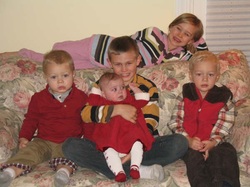
I am writing this on behalf of my father, Gary Lebeck, who has recently been to hell and back in his fight against colorectal cancer.
In March of 2006, my siblings and I had what may be referred to as an ‘intervention’ with our father. His health had been rapidly deteriorating over the course of the past several months and it became overwhelmingly apparent that he was in need of medical attention. Of course, in staying true to his stubborn ‘Iowa farm boy’ ways, this neither happened following our repeated pleas nor throughout the course of his declining health in the months leading up to our little ‘intervention’. One thing was certain, whether he go of his own free will or kicking and screaming in the clutches of his three sons, we were going to be sure he received the necessary help he was so desperately in need of.
In March of 2006, my siblings and I had what may be referred to as an ‘intervention’ with our father. His health had been rapidly deteriorating over the course of the past several months and it became overwhelmingly apparent that he was in need of medical attention. Of course, in staying true to his stubborn ‘Iowa farm boy’ ways, this neither happened following our repeated pleas nor throughout the course of his declining health in the months leading up to our little ‘intervention’. One thing was certain, whether he go of his own free will or kicking and screaming in the clutches of his three sons, we were going to be sure he received the necessary help he was so desperately in need of.
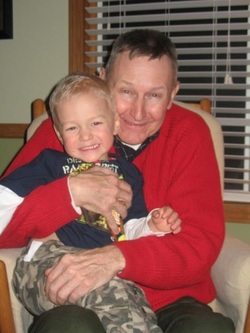
Finally, on May 1st of the same year, I was able to coax him into seeing my family doctor, Dr. Steven Wolfe, at the University of Iowa’s Hospitals and Clinics (Go Hawks!) in Iowa City. After a rather lengthy ‘checkup’, Dr. Wolfe informed me that he had every rational reason to believe that Gary in fact did have colorectal cancer based on the detection by digital rectal exam of a significant mass near the top to his rectum. As an important aside, knowing that his clinical presentation appeared entirely of the gastrointestinal nature, I was able to expedite an appointment with the Center for Digestive Diseases clinic the following day which culminated in the all-important colonoscopy on day 3. Results of the scope confirmed Dr. Wolfe’s suspicions and biopsy revealed his cancer to have advanced to stage 3 adenocarcinoma. Also due to the vascularity of the tumor, he had been losing blood steadily over the past several months resulting in him presenting with severe anemia. This subsequently required multiple blood transfusions over the course of the first two weeks post-diagnosis.
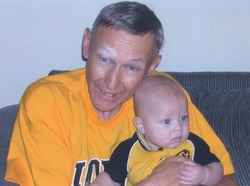
Following consultation with Dr. Daniel Berg in the Holden Comprehensive Cancer Center, he enrolled in a phase III clinical trial, and after randomization, was given the experimental oral chemotherapy drug Capcytabin (very effective in treatment of intestinal cancers) coupled with localized radiation over the next six weeks (end of May through June of 2006). It became apparent that he was responding to this pre-operative treatment well and the mass was dramatically reduced to a more surgically-manageable size.
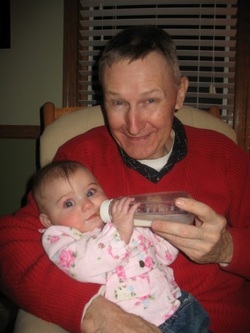
Near the end of July, following about a month of rest, he underwent surgery for final removal of residual cancer cells as well as multiple biopsies from lymphatic and adjacent tissues. Surgery was performed by Dr. James Howe who did a remarkable job in resection of the affected tissue, an improbable task considering the initial tumor size. This gave him the opportunity to forgoe any need for colostomy.
In August of 2006, he began bimonthly, standard chemotherapy which lasted through the remainder of the year (approximately 4 months).
Gary has been seen for 3 follow-up visits since chemotherapy completion and is presently cancer-free. As part of the clinical trial, he will be required to follow-up at least biannually for 5 years; a blessing considering his pre-diagnosis neglect of periodic medical check-ups (he went almost 25 years without seeing a doctor!).
It is virtually impossible to express the joy that we all feel in his recovery, and the reality that we still have him around to see his grandkids grow up. It could easily be said that had he (and/or we for that matter) waited even a few more months, he would surely have lost his battle.
In August of 2006, he began bimonthly, standard chemotherapy which lasted through the remainder of the year (approximately 4 months).
Gary has been seen for 3 follow-up visits since chemotherapy completion and is presently cancer-free. As part of the clinical trial, he will be required to follow-up at least biannually for 5 years; a blessing considering his pre-diagnosis neglect of periodic medical check-ups (he went almost 25 years without seeing a doctor!).
It is virtually impossible to express the joy that we all feel in his recovery, and the reality that we still have him around to see his grandkids grow up. It could easily be said that had he (and/or we for that matter) waited even a few more months, he would surely have lost his battle.
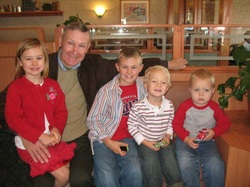
Near the end of July, following about a month of rest, he underwent surgery for final removal of residual cancer cells as well as multiple biopsies from lymphatic and adjacent tissues. Surgery was performed by Dr. James Howe who did a remarkable job in resection of the affected tissue, an improbable task considering the initial tumor size. This gave him the opportunity to forgoe any need for colostomy.
In August of 2006, he began bimonthly, standard chemotherapy which lasted through the remainder of the year (approximately 4 months).
Gary has been seen for 3 follow-up visits since chemotherapy completion and is presently cancer-free. As part of the clinical trial, he will be required to follow-up at least biannually for 5 years; a blessing considering his pre-diagnosis neglect of periodic medical check-ups (he went almost 25 years without seeing a doctor!).
It is virtually impossible to express the joy that we all feel in his recovery, and the reality that we still have him around to see his grandkids grow up. It could easily be said that had he (and/or we for that matter) waited even a few more months, he would surely have lost his battle.
In August of 2006, he began bimonthly, standard chemotherapy which lasted through the remainder of the year (approximately 4 months).
Gary has been seen for 3 follow-up visits since chemotherapy completion and is presently cancer-free. As part of the clinical trial, he will be required to follow-up at least biannually for 5 years; a blessing considering his pre-diagnosis neglect of periodic medical check-ups (he went almost 25 years without seeing a doctor!).
It is virtually impossible to express the joy that we all feel in his recovery, and the reality that we still have him around to see his grandkids grow up. It could easily be said that had he (and/or we for that matter) waited even a few more months, he would surely have lost his battle.